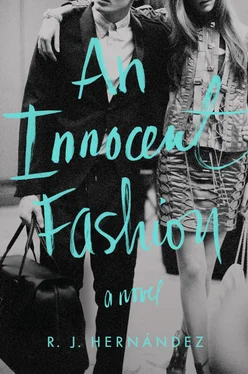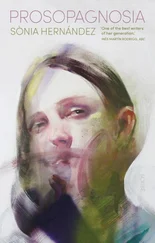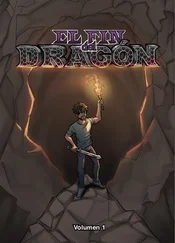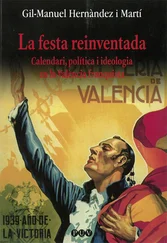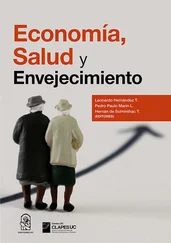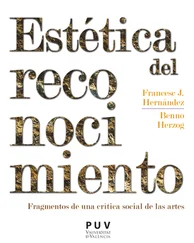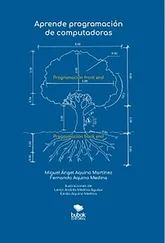I unzipped another garment bag. Ferragamo: A patent leather coat, a silk dress shirt, and a baby calfskin skirt, all white. They were the most stunning garments I’d ever touched — more beautiful even than the Valentino — and my heart almost stopped to think that people actually wore them. “Do we get to help him — you know, pick clothes and all that?”
“Just — get out of the way,” George grunted, before shoving me with his elbow. He ripped open a stapled shopping bag, and an avalanche of white Christian Louboutin shoes poured onto the floor, their famously red soles boasting the brightest display of color in the whole room. “Here,” he said, and thrust the camera in my hand. “Photograph everything, and fast .”
I UNPACKED DRESSES, HANDBAGS, AND GLOVES, ARRANGING the latter onto velvet trays on an accessories table, and about thirty minutes before the run-through, I had my first sight of a fashion editor.
She was as long and as elegant as a pruned stem, with skin so dark it was almost violet — a black-petaled orchid in a black Chanel dress suit. Her platinum-blonde hair, waved like Grace Kelly’s, caressed her shoulders in a stunning contrast to her face.
“Sabrina?” she called softly, with a tiny lilt of her head and the slightest whisper of a genteel Southern accent that harkened back to debutantes in pearl collars and A-line dresses.
Sabrina, who moments earlier had spewed, “Can you please connect me to someone with a comprehensive grasp of the English language?” to some poor person on the other line, slammed the receiver back into its cradle and swung her blonde head up, attention undivided: “Yes, Clara?”
“Who is that?” I whispered to George.
“That’s Clara, senior fashion editor.” And of course it was. I should have recognized her immediately, having seen her picture a million times — seated with Edmund and Jane and Ava Burgess in the front row at all the major fashion shows, her gloved hands always draped demurely over her crossed legs.
“She’s — amazing,” I sighed.
“Sabrina,” Clara’s tone hovered on song, “where are Edmund’s accessories from Alexander McQueen?” In one graceful movement she arrived at Sabrina’s desk and grazed the surface with her hand, which was as delicate as a doll’s, its fingers fused together. Crossing her ankles, she looked like she belonged in a fashion editorial herself.
“They had to be shipped from Paris,” Sabrina explained in a professional tone. Her hair today was down, as sleek as a sateen curtain. “I called to check up an hour ago. They said the package was on its way, but—”
“It’s extreeemely important,” Clara implored in her mint-julepy voice. She interlaced her fingers, her nude-polished nails catching the light. “Can somebody just go get it, wherever it is? Don’t even photograph it, just bring it straight to me.”
The next millisecond Sabrina was back on the phone while Clara was gliding coolly back to her desk.
“I’m calling to track a package,” Sabrina barked, in a very different voice from the one she had just used with Clara. “You said it was on a truck an hour ago when I called — where is it? What do you mean you’re not sure? I need it now . If it’s not on a truck, what facility is it at? Do you have an address? Do you have a phone number?. Yes, I’m looking at that right now on my screen, but your website doesn’t help. I need this information now . This — is — your —job .”
“What happens if they don’t get it in time?” I whispered to George.
George sighed deeply. “We have to get it on time. If we don’t, then—”
“Ethan,” Sabrina said.
I never found out from George what would happen.
“Ethan, come now.” I hadn’t even reached her desk before her hand appeared in my face, holding a credit card with a yellow sticky note on it. “Here is my corporate card, here is the address, here is the tracking number. Get the McQueen package here as fast as possible. It must be here before the run-through.”
Flowing with girlish loop-de-loops, Sabrina’s Post-it reminded me of the fake love notes cheerleaders slipped into the fat kids’ lockers in high school. I slipped her note into my pocket with her credit card (“Sabrina Walker, Hoffman-Lynch Publications”), and processed my task, turning back to retrieve my wallet from the desk. “Be right back,” I told George.
He waved me away as Sabrina rolled her chair into the farthest corner of her cubicle. I checked around in case I needed anything else, and was grabbing my wallet when Sabrina exploded over the wall with the intensity of a jack-in-the-box. “What are you still doing here?!” she shrieked, her head swinging like it was attached to a metal coil.
“I—?” I scampered out of the closet like a child from a haunted house, tripping over the Louboutins, and when I was just outside the Hoffman-Lynch building, amid the whir of cabs and gray suits, my cell phone vibrated with a message from George:
Are you there yet?
The girl with the mirror’s full name was Madeline Dupre, and she reappeared on our first day of classes. I had been hoping to see her before then around our residence hall, but in the two hectic days comprising freshmen orientation — a blur of welcome banquets and introductory meetings and mixers put on by the Student Council — I just never ran into her.
Now, my heart jumped as I watched her tuck her white chiffon dress underneath her and take a seat opposite me at a round wooden table. She spotted me and waved; I looked hastily down. With a deep breath, I tried to redeem myself with a glance in her general direction, but she had turned red, and was embarrassedly avoiding me by engrossing herself in the erratic dillydallying of our professor, Lloyd Pemberton.
Madeline and I were two of one dozen students gathered for his Political Systems course, a seminar, which thereafter would meet twice a week on the second floor of a hall called Lindsey-Chittenden. Having never been much attracted to politics, I had been invited to join the course by Pemberton himself, a jovial, tweed-loving Brit who served as a supervising dean of my residential hall and who, during the welcoming luncheons, had sat across from me and declined every dish except for four servings of bread pudding.
We would begin with a quiz, Professor Pemberton now announced, which would place us on a political spectrum, essentially categorizing us based on our liberal, or conservative, persuasions. “It’s not a real quiz — no right or wrong, that is — although. ” he added, twirling his gray-haired moustache as he helicoptered around the table “. the same can be said for any political matter — there’s never a right or wrong, and that of course, is the trouble with politics.” He stopped mid-putter and crossed one hand over his wooly suit, the other propping up his chin for one second, two seconds; made a “ hmm ” sound; then, remembering us, perking up with his wrinkled finger in the air.
“Introductions first,” he said, and began scratching a long horizontal line on the chalkboard — the economic spectrum, buttressed on opposite ends by the words left wing and right wing , then crossed through the center with a vertical line denoting the social spectrum. “Before you take the quiz, I want you to tell the class where you believe you fall on the political spectrum.”
Madeline’s crystalline voice resounded first. “I’m sorry to start us off, Professor, because — well, I disagree with both sides of the spectrum and I despise the current state of politics. I despise it so much, actually — I plan to be a senator, and turn the whole thing upside down.” She glanced around the table. “That might sound silly but it’s true,” she shrugged, “so nice to meet you all, and vote for me!” She flashed a consciously exaggerated politician’s smile, and the whole class laughed.
Читать дальше
